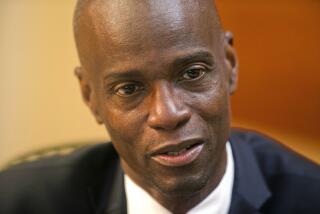Liberian Government Involved in Deaths of Officials, Families Say
- Share via
MONROVIA, Liberia — News of their husbands’ deaths came to Cynthia Yormie and Suzana Vaye in a simple sentence, uttered by a concerned community leader.
Yormie and Vaye had spent almost two weeks seeking the whereabouts of their spouses, deputy ministers who hadn’t been heard from since June 5 after having been detained by state security officials. So a community elder went to the government seeking information.
“Your husbands are no more,” the elder said when he returned.
The government will not discuss the case, but the distraught widows said at this point all they want is the bodies of John Yormie, the deputy minister of national security, and Isaac Vaye, deputy minister for technical services.
“We have not been told what killed them or how they died,” said Sonkarley Beaie, a spokesman for the families. “We all know that [the government] is involved, but it’s difficult to say the government did it.”
Local human rights activists say that, since coming to power in 1997, the military and security groups have relentlessly terrorized civilians, inflicting injury and creating mayhem with impunity.
“The human rights situation is very bad in Liberia,” said Frances Johnson-Morris, a former chief justice and now national director of the Catholic Justice and Peace Commission, a rights advocacy group based in Monrovia. “The security forces are a law unto themselves. They commit crimes and no one is held accountable.”
Liberian President Charles Taylor has denied mistreating his people and pointed to the 85% of votes he garnered in the 1997 general election as proof of his overwhelming popularity. He also denied sponsoring a brutal rebel group in neighboring Sierra Leone, an accusation that has led to indictment on war crimes charges.
Taylor’s rule is part of the equation Washington is trying to solve before deciding whether to deploy troops to help bring law and order to a nation settled by freed American slaves. But the White House insists that such a move would depend on Taylor’s stepping down and leaving the country, where 14 years of intermittent war have killed and displaced hundreds of thousands.
Slayings, abductions, looting, muggings, harassment and the use of child soldiers top the list of abuses endured by civilians during Taylor’s regime, activists here said.
Between 10 and 20 people come to the Catholic commission’s offices each month complaining of harassment, physical abuse or other violations, Johnson-Morris said. Many victims simply don’t report the crimes, fearing reprisals and knowing that their grievances, which should be referred to the police, will most likely fall on deaf ears.
Johnson-Morris said the root cause of the blatant disregard for the law was a lack of good leadership.
“The people who fought the war are now in government,” said Johnson-Morris. “But they have not been transformed. They still live as if they are at war with the civilians. They lack respect for the rule of law.”
It is widely believed that recently slain ministers Vaye and Yormie -- the latter is alleged to have participated in the brutal torture and execution of former Liberian President Samuel Doe -- were arrested in connection with a June 4 coup plot Taylor suspected was being hatched against him. The country’s vice president was also detained but later released.
The widows say their husbands were loyal servants of Taylor, and, if they had been charged with any crime, they should have been given a chance to plead their case in court.
The lawlessness has made many Liberians eager to flea the country. Cynthia Yormie said she and her nine children would rather live anywhere else but here.
Suzana Vaye said she would stay, but she feared for her life.
“If my husband, who had a master’s in water resources and a [bachelor’s] in civil engineering and served this government for years, can be slaughtered like this, what about me?” asked Vaye, who has six children.
Members of the country’s human rights community said their lives were also at risk for speaking out against the government. Johnson-Morris has been arrested for her frank views and criticisms, and so have other colleagues. Some activists have even gone into hiding.
“The government considers people who represent the rights of [others] as enemies,” said human rights lawyer Ishmael Campbell. “Once you attack the policies of the government, then you have a problem.”
More to Read
Sign up for Essential California
The most important California stories and recommendations in your inbox every morning.
You may occasionally receive promotional content from the Los Angeles Times.














